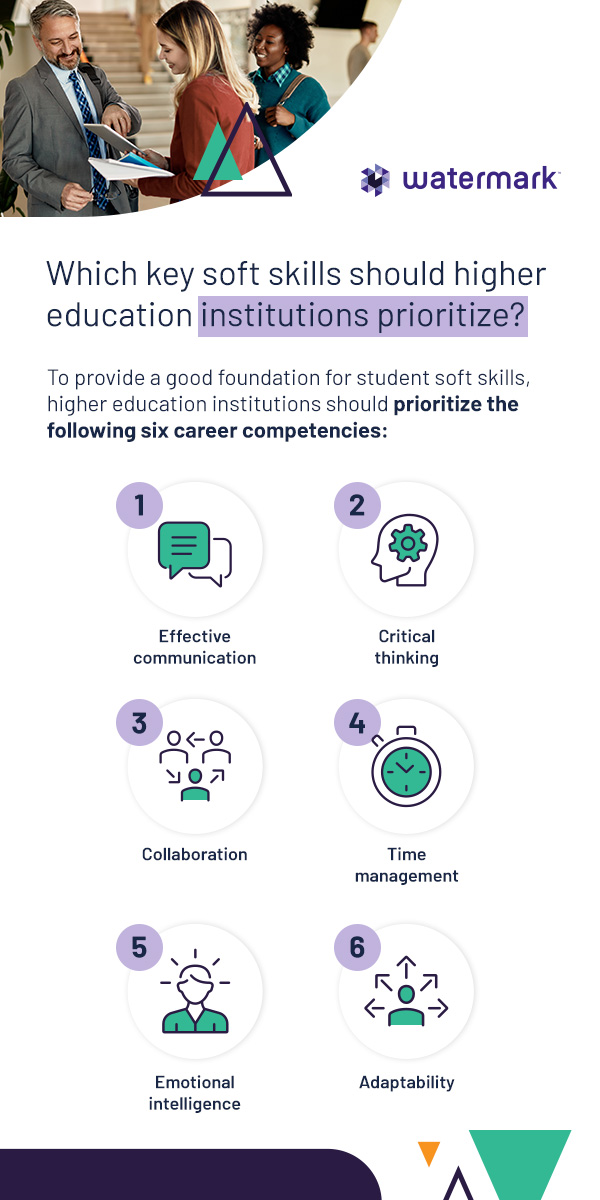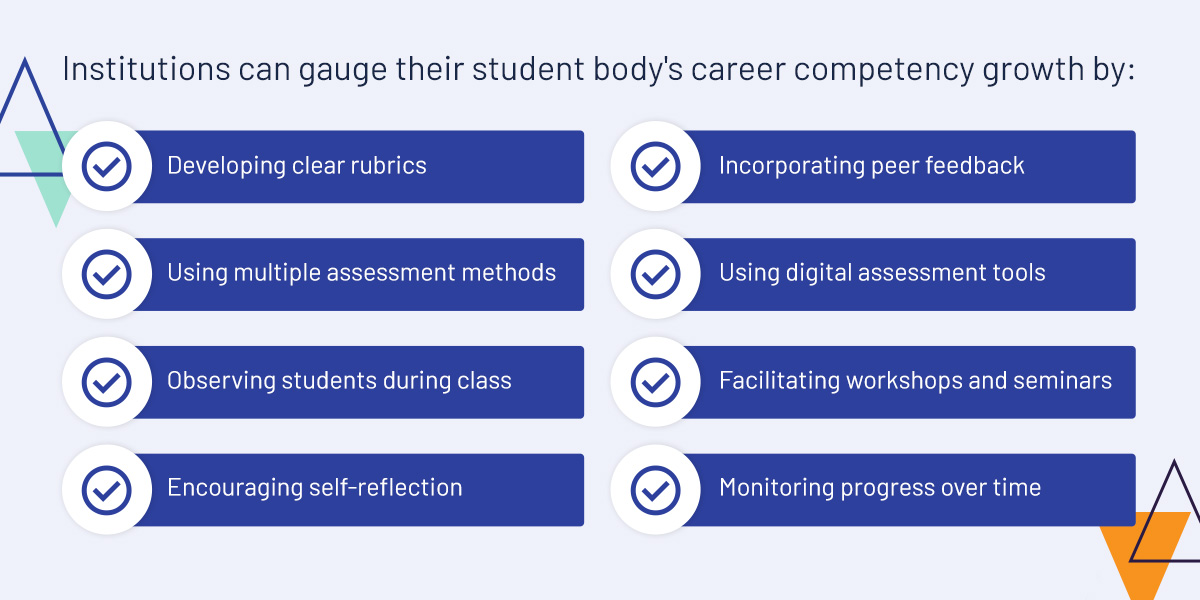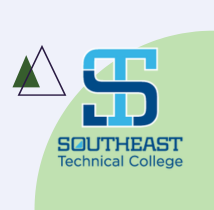



The ultimate goal of higher education is to give students the qualifications and tools they need to excel in their chosen career field. However, research by LinkedIn has shown that 92 percent of employers value soft skills equally to or more than technical skills. In light of this priority shift, colleges and universities can far better prepare their students for job market success if they focus on how to help students develop soft skills.
Read on to learn which key soft skills are most important for professional development, why employers so highly prize them, and how higher education faculty and administrators can build soft essential skills development into their curriculum.
Soft skills are general and interpersonal competencies like teamwork and leadership that people learn through experience, mentorship, and self-reflection. In comparison, hard skills are specific technical expertise like coding or mathematics that people learn through training and education. While hard skills are easy to assess using tests, soft skills require a more subjective, observational approach.
Higher education institutions almost exclusively focus on developing hard skills because they are quantifiable, require expert instruction, and are paramount for many specialized roles. Students usually build soft skills through internships, work experience, or extracurricular activities. Community service, sports, and student leadership are just a few ways students can learn soft skills, yet these activities are rarely a requirement for graduation.
While hard skills are very specific and nontransferrable from department to department, soft skills have far-reaching benefits in and out of the workplace. Companies value versatile employees with superb social skills and an excellent growth mindset because they’re able to:
An employee’s specialized expertise can only benefit the company if they manage their time and resources efficiently and responsibly and collaborate well with others. Without these essential soft skills, experts with high technical potential can’t make a positive, tangible impact.
Employers are increasingly prioritizing grit in their employees and potential new hires. When the pressure’s on, companies want to know their team members can persevere, adapt, and learn from challenges. Resilience also makes work life more fulfilling and enjoyable for employees.
Workers with well-developed soft skills often make great mentors and trainers. Even if a hiring manager is looking to fill an entry-level position, they’ll likely favor candidates who demonstrate potential as future leaders. Soft skills thereby create valuable promotion opportunities for college graduates.
Soft skills like problem-solving allow employees to critically analyze what works and what doesn’t. Once they’ve pinpointed areas rife for improvement, creativity and adaptability help them think up and implement new and improved strategies for success.
Recent graduates need a well-crafted resume and good interview etiquette to be considered for a position at a company. Well-developed soft skills are critical here, as many candidates share the same hard skills and qualifications. Soft skills such as engaging and professional written and verbal communication, personability, problem-solving, adaptability, and many others could be why your alumnus is hired over their competitors.
The recent artificial intelligence boom has created a renewed focus on interpersonal skills, as AI software is gradually assisting with more and more technical tasks.
Several reputable organizations have compiled lists of the most important soft skills for professional development and success, including:
The National Association of Colleges and Employers (NACE) outlines the essential aptitudes new job seekers need in their Career Readiness Competencies initiative. Of the many skills and behaviors that can help newly graduated college students succeed in the workplace, NACE proposes that the eight most critical are:
The United States Department of Labor and Office of Disability Employment Policy (ODEP) developed a curriculum called Soft Skills to Pay the Bills to enhance the career readiness of young people between 14 and 21 through essential soft skills. They formed their curriculum around six key skill areas that strongly echo NACE’s career competencies — communication, enthusiasm and attitude, teamwork, networking, problem-solving and critical thinking, and professionalism.
Based on the NACE and ODEP initiatives sharing similar priorities, we can determine which soft skills are generally considered pivotal for career success. To provide a good foundation for student soft skills, higher education institutions should prioritize the following six career competencies:
Communication is a soft skill that is highly beneficial for students both in and outside the office. Employees must be able to communicate clearly, appropriately, and consistently with their co-workers, clients, and trainees to build strong working relationships and get tasks done efficiently. Good communication skills also help employees receive and provide formal and informal feedback, which drives personal and professional development.
After graduation, new workers should ideally already be versed in critical skills like:
Students entering the workforce would also benefit from a basic corporate vocabulary, including terms like key performance indicators (KPIs), return on investment (ROI), total cost of ownership (TCO), and others.
How can higher education institutions help build communication skills?
Learners can practice various communication types within their hard skills classes in a university or college setting by giving presentations, writing essays, having class discussions and debates, and participating in other social learning activities. Regular interaction with educators also helps students learn polite and attentive communication skills with superiors.
Critical thinking involves using logic to evaluate facts and evidence to make informed judgments within a reasonable timeframe. Employees who think critically excel at problem-solving because they can identify essential information, distinguish it from the unimportant, and make pivotal decisions based on observable truths. The workplace poses various challenges daily, and employees with excellent critical thinking skills are best equipped to navigate them.
Instances where critical thinking is imperative in a professional setting include:
How can higher education institutions help foster critical thinking skills?
While university subjects like philosophy, psychology, ethics, and law directly address critical thinking, students from all departments benefit from learning how to solve problems rationally. Other more technical subjects can include specially formulated assignments and targeted test questions that challenge students to think critically about whatever subject they’re studying.
Collaboration is paramount for reaching common goals in academia and a professional setting, so employers often prioritize candidates who demonstrate excellent teamwork skills. Cooperating with coworkers on heftier projects opens the door to creative solutions, efficient task completion, higher-quality outputs, and relationship building. When employees work as a unit, the importance of communication skills also increases significantly.
To foster a productive collaborative environment, team members need to focus on:
How can higher education institutions help encourage collaboration skills?
In tertiary studies, group assignments are an excellent way to prepare students for teamwork in their careers. Whether it’s a multiauthor research project, group presentation, team debate, or even informal discussion circles, students will learn to strive alongside their peers and discover the best strategies for group success. Educators can include teamwork as an assessment criterion in their rubric, and students can earn from the feedback they get.
Once students enter the working world, their learning about time management will become pivotal for career success. Employees with good time management skills submit their tasks more timeously and regularly, making them reliable and efficient in their employer’s eyes. They’ll also likely have a better work-life balance, a calmer, more organized work environment, and less deadline stress.
Effective time management should include:
How can higher education institutions help introduce time management skills?
Time management is an indispensable skill that most students already grapple with during their studies, making time to revise for exams, completing and turning in assignments before deadlines, and balancing classes with extracurricular activities. For more support, educators can supplement assignments with time-blocking suggestions, and orientation can include a workshop or literature on planning and managing responsibilities.
Emotional intelligence involves recognizing one’s emotions, empathizing with others, and forming effective strategies for dealing with both. Since the average person will spend approximately 90,000 hours at work over their lifetime, professional challenges can profoundly impact a person’s overall quality of life. Mental resilience is thus crucial to prevent burnout and keep employees producing good work for their employers.
Ways emotional intelligence can boost work performance and satisfaction include:
How can higher education institutions help strengthen emotional intelligence?
At school, students build emotional intelligence through workshops and seminars, support from mentors, receiving feedback from peers and instructors, participating in sports or other extracurricular activities, on-campus counseling services, building relationships with classmates and friends, and reading self-improvement literature.
Adaptability is a cornerstone of consistent career progression. As modern technology develops rapidly and the scope of roles changes alongside it, employees must try new things and learn on the job to stay useful and relevant. Artificial intelligence is an excellent example of this crucial shift, with many employees in creative fields adapting their workflows and best practices to embrace AI and avoid being made redundant.
To prepare for these situations, students must build several strong soft skills that transfer well between roles, departments, and industries, including:
How can higher education institutions help encourage adaptability?
Changing client preferences, management changes, evolving industry standards, unexpected setbacks, and new competitors can all spur drastic workplace changes, calling for agile reactions from employees. In a higher education setting, educators can plan a few assignments that demand student adaptability by setting limitations on resources, formats, and other variables. Students can then gain experience and use the feedback to bolster their soft skills.
Since soft skills are more subjective and qualitative than hard skills, they require a nuanced approach during evaluation. There are several methods educators can use to assess soft skill development in their students, and these strategies work best when combined. Institutions can gauge their student body’s career competency growth by:
Faculty experts from renowned colleges and universities have long acknowledged how challenging it can be to accurately evaluate student soft skills. As a result, esteemed experts have developed and tested various outcomes assessment methods that higher education institutions can add to their curricula.
Self-assessments are valuable tools for assessing soft skill development in college students. Psychologist Professor Angela Duckworth’s GRIT test is a set of 12 questions that investigate a person’s attitudes and behaviors in the face of challenges and growth opportunities. While qualitative, it’s a useful way to gauge how confident students feel in their soft skills and where educators should focus their support.
The American Association of Colleges and Universities (AAC&U) developed the VALUE rubrics for evaluating soft skills in undergraduate students from 2007 to 2009. It assesses 16 learning outcomes essential for personal and professional growth, including oral and written communication, teamwork, creative and critical thinking, information literacy, intercultural knowledge, and competence and foundations and skills for lifelong learning.
VALUE rubrics are particularly useful for criteria-referenced soft skill evaluation graded by instructors. Because VALUE rubrics are open source, they can be integrated into data analytics software so you can keep all essential student development data in one centralized hub and extract valuable, holistic insights.
With the right digital tools, higher education institutions can maximize their educational impact and streamline their soft-skill-building strategies. With Watermark’s industry-leading software suite, higher education institutions can plan, track, and evaluate student growth all in one place and seamlessly extract many valuable insights. Our innovative tools allow educators to:
Watermark has also partnered with Lightcast to create the Market Landscape Data Pack, providing colleges and universities with essential labor market data to improve their soft skills programs. This innovative resource includes real-world workplace information, such as regional demographics and labor trends, supporting data-driven decisions that help students succeed after graduation.
To get Watermark on your institution’s side and start supporting the career readiness of your students in a tangible way, request a demo from us today.




































































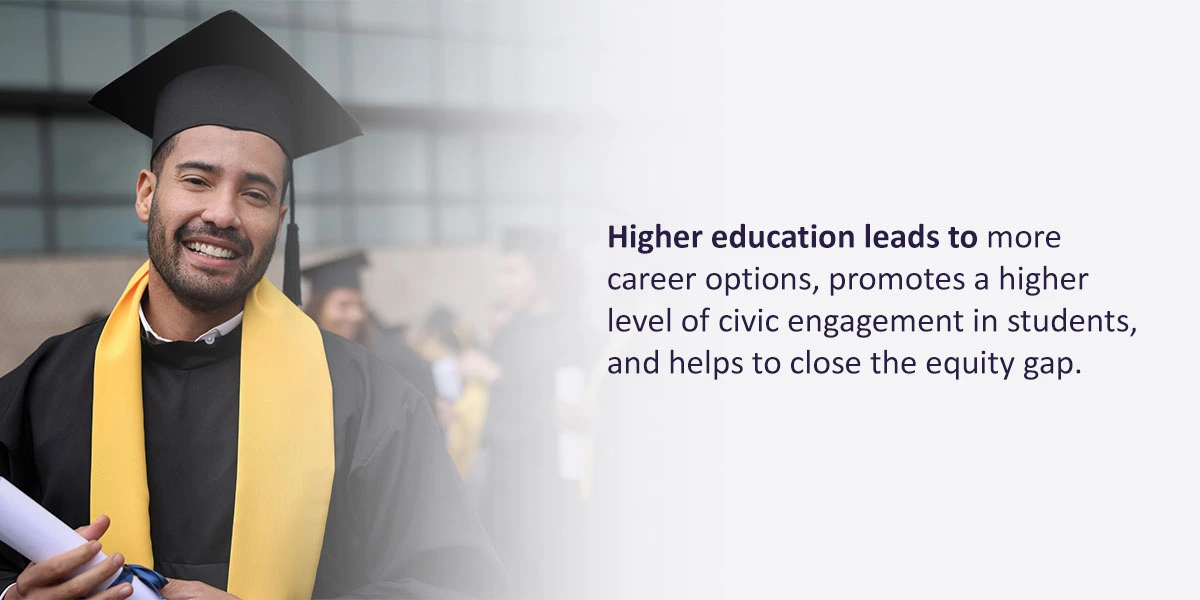



































































































































































































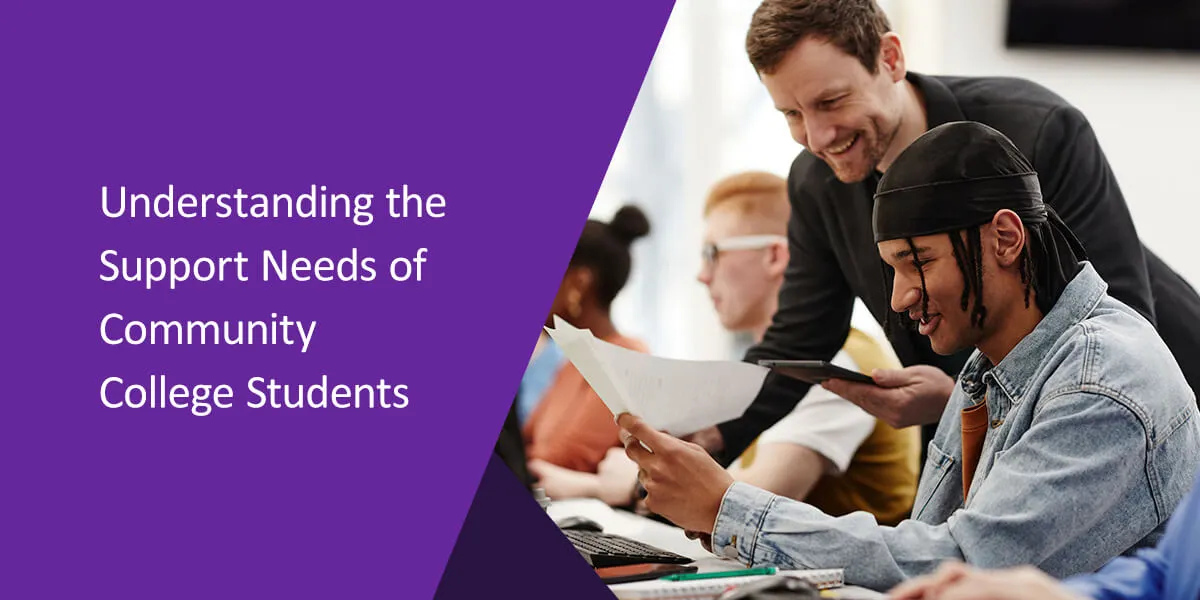





















































































































Submit this form to schedule a meeting with one of our reps to learn more about our solutions. If you need customer support instead, click here.

